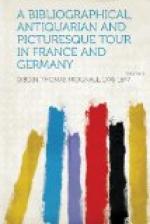From the Church, we may fairly make any thing but a digression—in discoursing of one of its brightest ornaments, in the person of Monsieur LANGEVIN:—a simple priest—as he styles himself in an octavo volume, which entitles him to the character of the best living HISTORIAN OF FALAISE. He is a mere officiating minister in the church of Mons. Mouton; and his salary, as he led me to infer, could be scarcely twenty louis per annum. Surely this man is among the most amiable and excellent of God’s creatures! But it is right that you should know the origin and progress of our acquaintance. It was after dinner, on one of the most industriously spent of my days here—and the very second of my arrival,—that the waiter announced the arrival of the Abbe Langevin, in the passage, with a copy of his History beneath his arm. The door opened, and in walked the stranger—habited in his clerical garb—with a physiognomy so benign and expressive, and with manners so gentle and well-bred,—that I rose instinctively from my seat to give him the most cordial reception. He returned my civility in a way which shewed at once that he was a man of the most interesting simplicity of character. “He was aware (he said) that he had intruded; but as he understood “Monsieur was in pursuit of the antiquities of the place, he had presumed to offer for his acceptance a copy of a work upon that subject—of which he was the humble author.” This work was a good sized thick crown octavo, filling five hundred closely and well-printed pages; and of which the price was fifty sous! The worthy priest, seeing my surprise on his mentioning the price, supposed that I had considered it as rather extravagant. But this error was rectified in an instant. I ordered three copies of his historical labours, and told him my conscience would not allow me to pay him less than three francs per copy. He seemed to be electrified: rose from his seat:—and lifting up one of the most expressive of countenances, with eyes apparently suffused with tears—raised both his hands, and exclaimed.... “Que le bon Dieu vous benisse—les Anglois sont vraiement genereux!”
For several seconds I sat riveted to my seat. Such an unfeigned and warm acknowledgment of what I had considered as a mere matter-of-course proposition, perfectly astounded me: the more so, as it was accompanied by a gesture and articulation which could not fail to move any bosom—not absolutely composed of marble. We each rallied, and resumed the conversation. In few but simple words he told me his history. He had contrived to weather out the Revolution, at Falaise. His former preferment had been wholly taken from him; and he was now a simple assistant in the church of Mons. Mouton. He had yielded without resistance; as even remonstrance would have been probably followed up by the guillotine. To solace himself in his afflictions, he had recourse to his old favourite studies of medicine and




